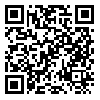Volume 7, Issue 28 (2014)
LCQ 2014, 7(28): 31-51 |
Back to browse issues page
Download citation:
BibTeX | RIS | EndNote | Medlars | ProCite | Reference Manager | RefWorks
Send citation to:



BibTeX | RIS | EndNote | Medlars | ProCite | Reference Manager | RefWorks
Send citation to:
Text and power
theoretical framework for critical interpretation of text. LCQ 2014; 7 (28) :31-51
URL: http://lcq.modares.ac.ir/article-29-2723-en.html
URL: http://lcq.modares.ac.ir/article-29-2723-en.html
Abstract: (10126 Views)
Abstract Text and power theoretical framework for critical interpretation of text In this study we have tried -to comment on the importance of text in social and literary research - to provide a theoretical framework for critical interpretation. Question of this research is : H ow text power does.To answer this question , we will review the theories of power in the humanities and social sciences . Two main theories have been proposed in this field . Rule-based theories in which emphasize power as a physical or class or governmental force. Other theories emphasize power as the discoursive or the lingual that applay Through subjective and desubjective processes. at For this purpose will read the votes of four of the most important contemporary theorists , Ernesto Laclau and Chantal Mouffe , Slavoj Žižek and Julia Kristeva until will be given research question. Finally, the responses of these theories will be presented .
Article Type: Theoretical |
Subject:
Literary Theory|socioliterature
Received: 2014/05/19 | Accepted: 2014/11/5 | Published: 2015/01/21
Received: 2014/05/19 | Accepted: 2014/11/5 | Published: 2015/01/21
| Rights and permissions | |
 |
This work is licensed under a Creative Commons Attribution-NonCommercial 4.0 International License. |







